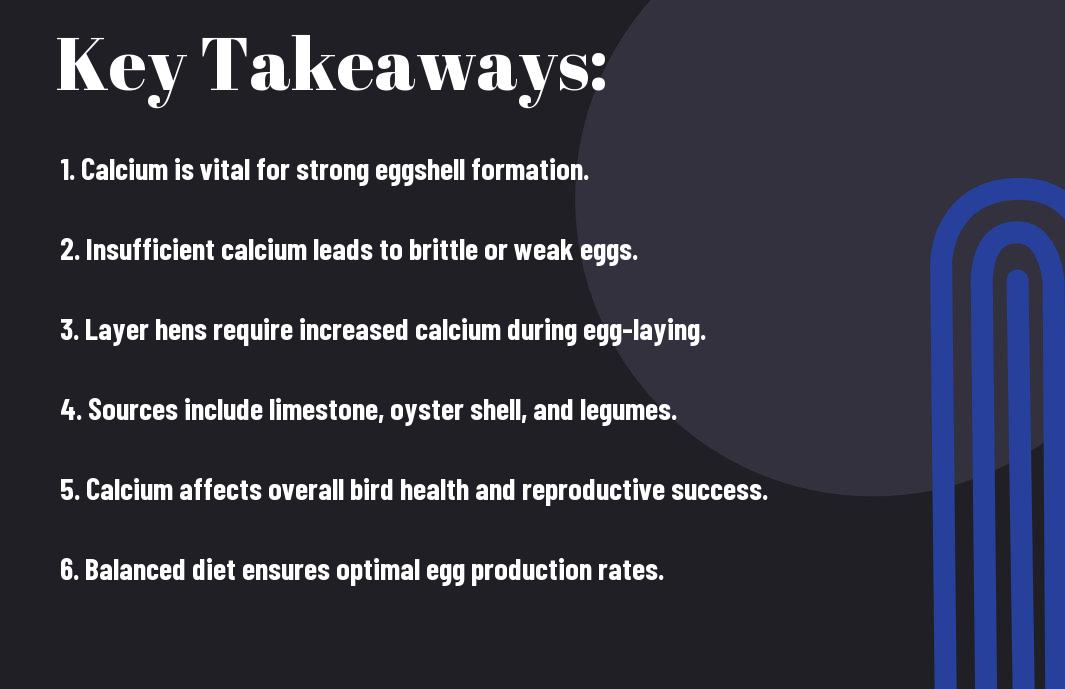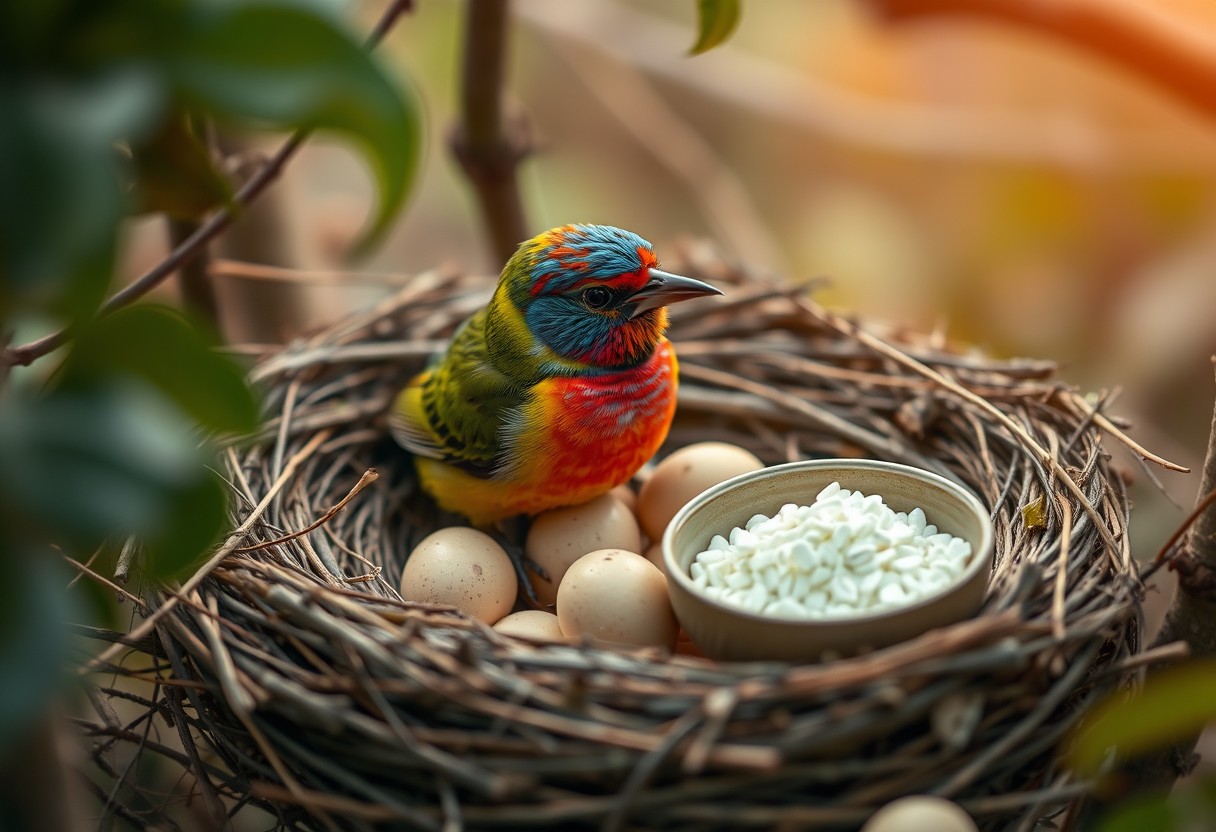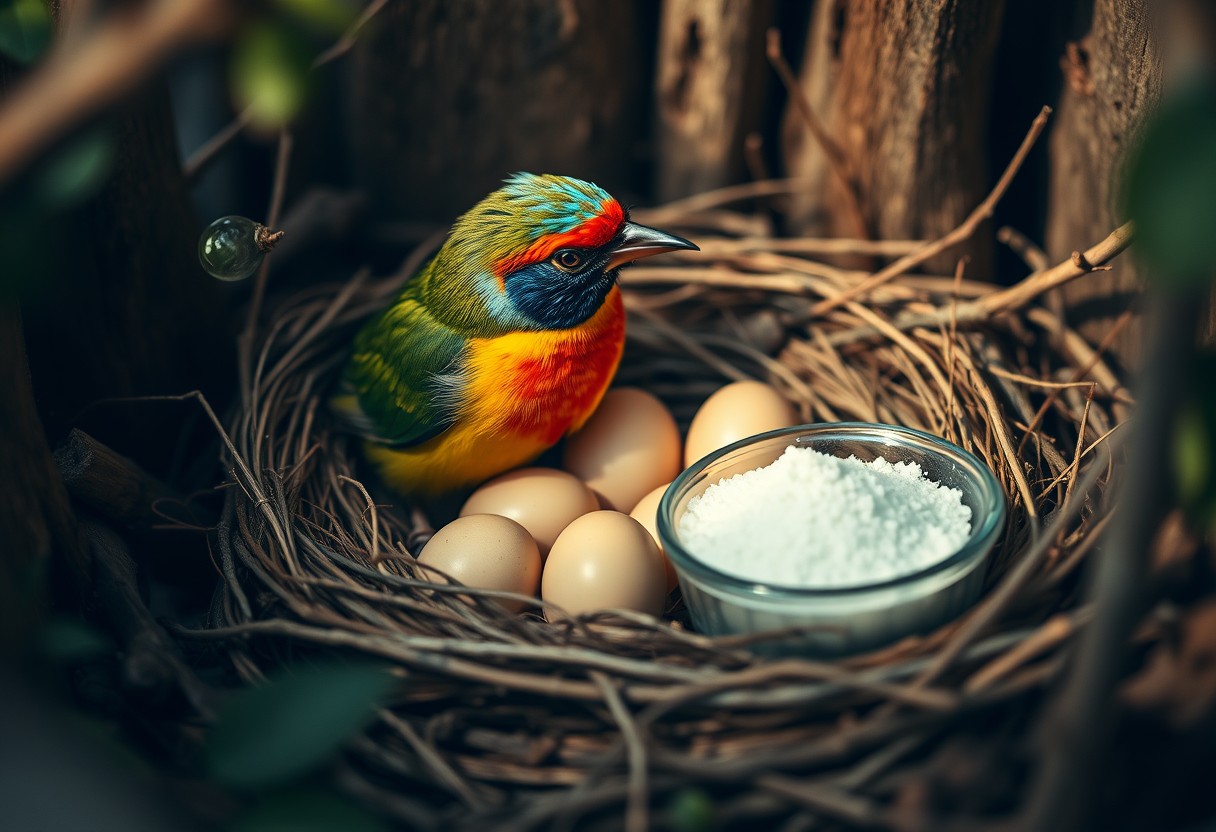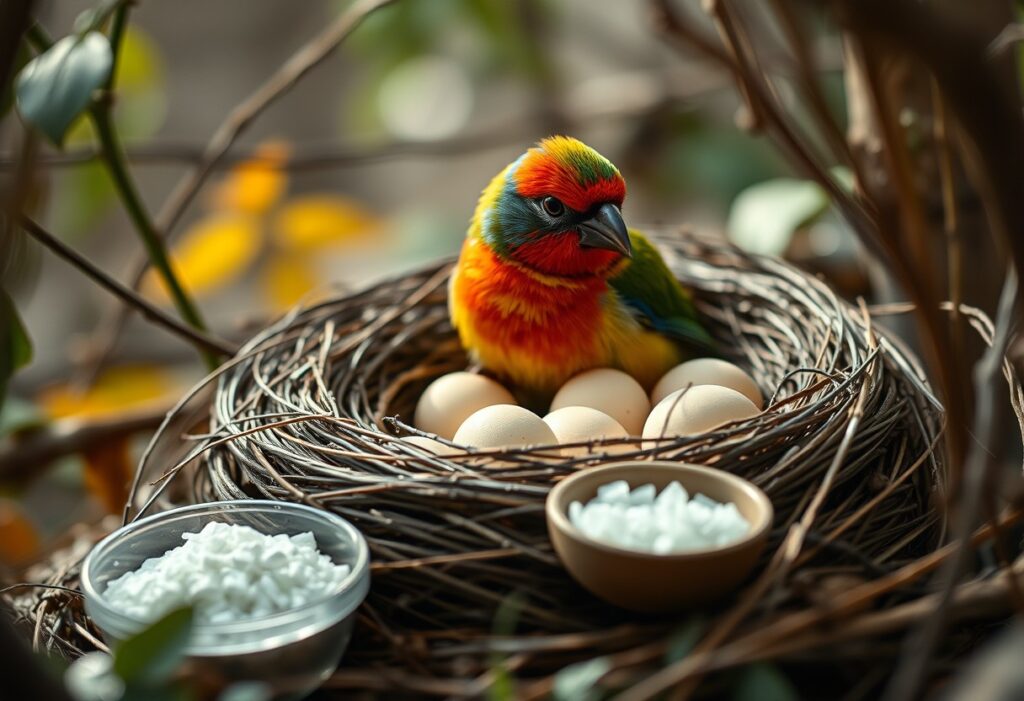Bird health and reproductive success greatly rely on calcium, a crucial mineral for efficient egg production. If you are raising birds, understanding the importance of calcium in your birds’ diets can prevent weak eggshells and lower egg production rates. Calcium not only supports the formation of strong eggs but also plays a vital role in overall physiological functions. By ensuring your birds receive adequate calcium, you can promote healthier laying cycles and enhance the sustainability of your flock.


Importance of Calcium in Egg Production
For your birds to produce eggs efficiently and effectively, calcium plays a critical role in their overall health and egg production capabilities. As a key mineral, calcium not only supports various physiological functions but is also crucial for the formation and strength of the egg shells. When you ensure that your birds receive an adequate supply of calcium, you enable them to produce higher quality eggs and maintain their reproductive health.
Calcium as a Structural Component
Importance of calcium cannot be understated when it comes to the structural integrity of bird eggs. The egg shell, which is primarily composed of calcium carbonate, acts as a protective barrier for the developing embryo inside. This mineral not only provides strength to the shell but also contributes to its overall thickness, which is crucial for withstanding environmental stresses. When you prioritize calcium in your birds’ diets, you are effectively supporting the formation of robust and resilient egg shells that help guard against physical damage and microbial invasion.
Role in Shell Formation
One of the most significant roles that calcium plays in egg production is in the process of shell formation. During the laying cycle, hens use calcium from their bones and dietary sources to create the hard outer layer of their eggs. This process is vital because a strong shell ensures that the egg remains intact throughout the laying process and while being handled post-laying. Inadequate dietary calcium leads to thinner shells and increased risk of breakage, which can greatly affect your flock’s productivity and profitability.
Calcium plays a crucial role in the transfer of minerals from the hen’s body to the egg, particularly during the formation stages in the oviduct. It is absorbed and deposited to create the hard shell, with approximately 95% of the egg’s shell being composed of calcium carbonate. By ensuring that your hens have a consistent supply of calcium, you enhance their ability to form shells efficiently and effectively.
Consequences of Calcium Deficiency
Formation of calcium deficiency in your birds can lead to dire consequences, especially affecting their egg production and overall health. Hens that do not receive sufficient calcium may lay eggs with soft or malformed shells, which makes them prone to breakage. Moreover, chronic calcium deficiency can result in severe structural issues for your birds, including the weakening of their bones, which may lead to fractures and mobility problems. Therefore, it is vital that you monitor and provide a calcium-rich diet to your flock.
To highlight the dangers of calcium deficiency, know that it not only impacts egg quality but also your flock’s general wellbeing. If left unaddressed, a lack of calcium can lead to disorders such as osteoporosis in laying hens and impact their longevity in the egg-laying cycle. You’ll want to ensure your birds receive an adequate amount of calcium through supplements or calcium-rich feed to maximize their egg production and health. Recall, healthy birds produce healthy eggs!

Calcium Sources for Birds
One of the most critical aspects of ensuring that your birds produce healthy eggs lies in providing adequate sources of calcium. Understanding the various options available to you can significantly enhance the overall health and productivity of your flock. Calcium is a vital mineral that supports not only egg production but also the structural integrity of the eggs themselves. Ensuring your birds receive sufficient calcium is imperative for their reproductive success and your overall enjoyment of keeping birds.
Natural Diets and Calcium Intake
The natural diets of birds often include a variety of food sources rich in calcium. For many bird species, calcium is obtained from foods such as seeds, leafy greens, and even insects. Providing a diverse diet allows your birds to access the calcium they need from their natural forage, which is necessary for proper egg formation. You should strive to replicate this diversity in their diets to optimize their calcium intake.
In addition to seeds and greens, certain fruits like figs and vegetables such as broccoli can also contribute to a bird’s calcium intake. Therefore, it’s crucial to understand the unique dietary preferences of your bird species and incorporate these calcium-rich foods into their meals. A well-balanced and natural diet can make a significant difference in your birds’ ability to produce strong, healthy eggs.
Calcium Supplements
Any bird owner may occasionally need to supplement their birds’ diets with calcium to ensure they meet their needs. Supplements can be beneficial, especially in situations where natural sources may not provide adequate amounts. These supplements come in various forms, including powder, grit, and fortified treats, so you have many options to choose from based on your birds’ preferences and requirements. When selecting supplements, look for those that are specifically designed for birds, as they will have the right balance of nutrients.
With the growing concern of calcium deficiencies in birds, choosing the right supplements is imperative. The timing and frequency of supplementation depend on your birds’ dietary habits and overall health. It’s advisable to monitor your birds closely and adjust their supplementation based on their specific needs, especially during peak laying times or adverse conditions that increase calcium demand.
The Role of Soil and Plant Calcium
Natural sources of calcium are often intertwined with the soil and the plants grown in it. Soil quality plays a significant role in the availability of calcium to birds, as the mineral is absorbed by plants from the ground. Consequently, birds consuming a diet rich in native flora can substantially benefit from the calcium naturally contained in these plants. If you aim to support your birds’ dietary needs holistically, consider not only what you feed them but also the plants accessible to them.
Soil health is paramount for optimal plant growth and the calcium content within those plants. Maintaining soil quality through appropriate maintenance practices will enhance plant absorption of minerals like calcium, thereby improving the nutritional benefits your birds receive when foraging or being fed those plants. Thus, not only should you focus on dietary options but also on how the environment impacts the calcium intake of your birds.
Calcium Metabolism in Birds
Not every bird species has the same requirements for calcium, nor do they metabolize it in identical ways. Understanding how calcium metabolism works in birds is vital for promoting optimal egg production and ensuring the health of your avian friends. The entire process begins with the absorption of calcium from your bird’s diet, and this involves specific mechanisms that allow efficient utilization of this imperative mineral.
Absorption Mechanisms
With regard to the absorption process, birds primarily take in calcium through their digestive system. The small intestine plays a crucial role in absorbing calcium ions from the food you provide for your birds. It’s important to note that the availability of calcium can be affected by various factors such as dietary composition, the presence of other minerals, and age. Birds benefit from a diet containing calcium-rich sources like leafy greens, crushed eggshells, and fortified pellets.
Furthermore, the type of calcium present in your bird’s diet can influence how well it is absorbed. Organic forms, such as calcium carbonate found in natural food sources, are generally more bioavailable than synthetic forms. Therefore, ensuring that your birds have access to high-quality, calcium-rich foods will directly impact their calcium absorption efficiency and overall reproductive health.
Hormonal Regulation of Calcium Levels
On the other hand, maintaining appropriate calcium levels in your birds is also regulated by hormones. The main hormones involved include parathyroid hormone (PTH), calcitonin, and vitamin D. PTH plays a crucial role in increasing calcium levels in the bloodstream when they fall too low by stimulating the release of calcium from your bird’s bones, promoting absorption in the intestine, and regulating excretion through the kidneys. Vitamin D, activated in the body, works closely with PTH to ensure efficient calcium uptake and utilization.
Moreover, calcitonin, released from the thyroid gland, serves to lower calcium levels when they are elevated, ensuring a delicate balance. This balance is particularly important for birds during the egg-laying process, as the demand for calcium peaks. If you observe any fluctuations in your bird’s laying patterns or overall health, it may indicate a disruption in this hormonal regulation.
Mechanisms of hormonal regulation are imperative for your birds’ metabolic processes. An imbalance can lead to severe consequences, such as eggshell thinning or even egg-binding, so monitoring your birds’ calcium intake and overall health is critical for sustaining proper hormonal function.
Calcium Storage in the Body
For calcium storage, birds primarily utilize their bones as the main reservoir. Unlike mammals, most avian species have a unique ability to mobilize calcium from their bones during the critical periods of egg production. This is imperative because a significant amount of calcium is required for the formation of eggshells, which are crucial for the protection of the growing embryo.
Additionally, it is important to ensure that your birds have adequate calcium in their diet consistently, as it not only bolsters egg production but also supports their skeletal health. Insufficient calcium can lead to long-term problems in their bone density and overall physiological well-being, which can subsequently affect their reproductive success.
Hormonal influences also play a vital role in how calcium is stored in your birds’ bodies. When hormonal balance is struck correctly, the mobilization of calcium from the bones can happen swiftly and effectively. The osteoclasts in bone tissue help to break down the bone matrix, releasing calcium into the bloodstream as needed. By providing a stable source of dietary calcium and ensuring proper hormonal balance, you can facilitate optimal egg production and maintain the health of your birds.
Summing up
Following this discussion on the role of calcium in bird egg production, it’s clear that ensuring your birds receive sufficient calcium is vital for both their health and the quality of their eggs. Calcium contributes significantly to the development of strong eggshells, which are vital for protecting the embryos during incubation. If you have hens or are involved in poultry management, you must monitor their calcium intake closely, as deficiencies can lead to problems such as thin-shelled eggs or even egg binding, which could have severe repercussions for your flock.
Moreover, it’s important to remember that the type of calcium supplement you provide can affect how well your birds utilize this critical mineral. Whether it’s through crushed oyster shells, limestone, or other calcium-rich sources, you should choose what best fits your management practices and your birds’ needs. By prioritizing calcium in your feeding practices, you can enhance the productivity and overall well-being of your birds, leading to more successful and sustainable egg production. Your active involvement in their dietary needs plays a fundamental role in achieving these goals.
FAQ
Q: Why is calcium important for bird egg production?
A: Calcium plays a crucial role in the formation of eggshells, which are vital for the protection of the developing embryo inside the egg. A sufficient supply of calcium ensures that the eggshells are strong and durable, preventing breakage and providing a safe environment for the growing chick. Insufficient calcium levels can lead to thin-shelled eggs, increasing the risk of damage and reducing the overall reproductive success of the bird.
Q: What can happen if a bird does not get enough calcium during egg production?
A: If a bird does not receive adequate calcium during the egg-laying process, it can result in several health issues. The most immediate consequence is the production of thin or weak eggshells, which may lead to egg breakage during laying or handling. This not only decreases the bird’s reproductive success but can also lead to stress and health complications, such as metabolic bone disease. Over time, chronic calcium deficiency can result in poor overall health and reduced egg production.
Q: How can bird owners ensure their birds receive enough calcium for egg production?
A: Bird owners can ensure their birds receive sufficient calcium through a balanced diet that includes calcium-rich foods, such as leafy greens, small amounts of dairy products, and commercial bird pellets fortified with calcium. Additionally, providing cuttlebone or mineral blocks can help birds actively replenish their calcium intake. Regular veterinary check-ups can also help monitor calcium levels and address any deficiencies before they impact egg production.










